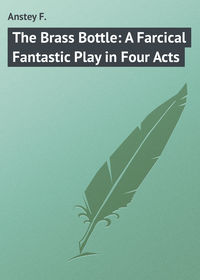 полная версия
полная версияThe Brass Bottle
He had a vague impression of the bottle lying on its side, with dense volumes of hissing, black smoke pouring out of its mouth and towering up in a gigantic column to the ceiling; he was conscious, too, of a pungent and peculiarly overpowering perfume. "I've got hold of some sort of infernal machine," he thought, "and I shall be all over the square in less than a second!" And, just as he arrived at this cheerful conclusion, he lost consciousness altogether.
He could not have been unconscious for more than a few seconds, for when he opened his eyes the room was still thick with smoke, through which he dimly discerned the figure of a stranger, who seemed of abnormal and almost colossal height. But this must have been an optical illusion caused by the magnifying effects of the smoke; for, as it cleared, his visitor proved to be of no more than ordinary stature. He was elderly, and, indeed, venerable of appearance, and wore an Eastern robe and head-dress of a dark-green hue. He stood there with uplifted hands, uttering something in a loud tone and a language unknown to Horace.
Ventimore, being still somewhat dazed, felt no surprise at seeing him. Mrs. Rapkin must have let her second floor at last – to some Oriental. He would have preferred an Englishman as a fellow-lodger, but this foreigner must have noticed the smoke and rushed in to offer assistance, which was both neighbourly and plucky of him.
"Awfully good of you to come in, sir," he said, as he scrambled to his feet. "I don't know what's happened exactly, but there's no harm done. I'm only a trifle shaken, that's all. By the way, I suppose you can speak English?"
"Assuredly I can speak so as to be understood by all whom I address," answered the stranger.
"Dost thou not understand my speech?"
"Perfectly, now," said Horace. "But you made a remark just now which I didn't follow – would you mind repeating it?"
"I said: 'Repentance, O Prophet of God! I will not return to the like conduct ever.'"
"Ah," said Horace. "I dare say you were rather startled. So was I when I opened that bottle."
"Tell me – was it indeed thy hand that removed the seal, O young man of kindness and good works?"
"I certainly did open it," said Ventimore, "though I don't know where the kindness comes in – for I've no notion what was inside the thing."
"I was inside it," said the stranger, calmly.
CHAPTER IV
AT LARGE"So you were inside that bottle, were you?" said Horace, blandly. "How singular!" He began to realise that he had to deal with an Oriental lunatic, and must humour him to some extent. Fortunately he did not seem at all dangerous, though undeniably eccentric-looking. His hair fell in disorderly profusion from under his high turban about his cheeks, which were of a uniform pale rhubarb tint; his grey beard streamed out in three thin strands, and his long, narrow eyes, opal in hue, and set rather wide apart and at a slight angle, had a curious expression, part slyness and part childlike simplicity.
"Dost thou doubt that I speak truth? I tell thee that I have been confined in that accursed vessel for countless centuries – how long, I know not, for it is beyond calculation."
"I should hardly have thought from your appearance, sir, that you had been so many years in bottle as all that," said Horace, politely, "but it's certainly time you had a change. May I, if it isn't indiscreet, ask how you came into such a very uncomfortable position? But probably you have forgotten by this time."
"Forgotten!" said the other, with a sombre red glow in his opal eyes. "Wisely was it written: 'Let him that desireth oblivion confer benefits – but the memory of an injury endureth for ever.' I forget neither benefits nor injuries."
"An old gentleman with a grievance," thought Ventimore. "And mad into the bargain. Nice person to have staying in the same house with one!"
"Know, O best of mankind," continued the stranger, "that he who now addresses thee is Fakrash-el-Aamash, one of the Green Jinn. And I dwelt in the Palace of the Mountain of the Clouds above the City of Babel in the Garden of Irem, which thou doubtless knowest by repute?"
"I fancy I have heard of it," said Horace, as if it were an address in the Court Directory. "Delightful neighbourhood."
"I had a kinswoman, Bedeea-el-Jemal, who possessed incomparable beauty and manifold accomplishments. And seeing that, though a Jinneeyeh, she was of the believing Jinn, I despatched messengers to Suleyman the Great, the son of Daood, offering him her hand in marriage. But a certain Jarjarees, the son of Rejmoos, the son of Iblees – may he be for ever accursed! – looked with favour upon the maiden, and, going secretly unto Suleyman, persuaded him that I was preparing a crafty snare for the King's undoing."
"And, of course, you never thought of such a thing?" said Ventimore.
"By a venomous tongue the fairest motives may be rendered foul," was the somewhat evasive reply. "Thus it came to pass that Suleyman – on whom be peace! – listened unto the voice of Jarjarees and refused to receive the maiden. Moreover, he commanded that I should be seized and imprisoned in a bottle of brass and cast into the Sea of El-Karkar, there to abide the Day of Doom."
"Too bad – really too bad!" murmured Horace, in a tone that he could only hope was sufficiently sympathetic.
"But now, by thy means, O thou of noble ancestors and gentle disposition, my deliverance hath been accomplished; and if I were to serve thee for a thousand years, regarding nothing else, even thus could I not requite thee, and my so doing would be a small thing according to thy desserts!"
"Pray don't mention it," said Horace; "only too pleased if I've been of any use to you."
"In the sky it is written upon the pages of the air: 'He who doth kind actions shall experience the like.' Am I not an Efreet of the Jinn? Demand, therefore, and thou shalt receive."
"Poor old chap!" thought Horace, "he's very cracked indeed. He'll be wanting to give me a present of some sort soon – and of course I can't have that… My dear Mr. Fakrash," he said aloud, "I've done nothing – nothing at all – and if I had, I couldn't possibly accept any reward for it."
"What are thy names, and what calling dost thou follow?"
"I ought to have introduced myself before – let me give you my card;" and Ventimore gave him one, which the other took and placed in his girdle. "That's my business address. I'm an architect, if you know what that is – a man who builds houses and churches – mosques, you know – in fact, anything, when he can get it to build."
"A useful calling indeed – and one to be rewarded with fine gold."
"In my case," Horace confessed, "the reward has been too fine to be perceived. In other words, I've never been rewarded, because I've never yet had the luck to get a client."
"And what is this client of whom thou speakest?"
"Oh, well, some well-to-do merchant who wants a house built for him and doesn't care how much he spends on it. There must be lots of them about – but they never seem to come in my direction."
"Grant me a period of delay, and, if it be possible, I will procure thee such a client."
Horace could not help thinking that any recommendation from such a quarter would hardly carry much weight; but, as the poor old man evidently imagined himself under an obligation, which he was anxious to discharge, it would have been unkind to throw cold water on his good intentions.
"My dear sir," he said lightly, "if you should come across that particular type of client, and can contrive to impress him with the belief that I'm just the architect he's looking out for – which, between ourselves, I am, though nobody's discovered it yet – if you can get him to come to me, you will do me the very greatest service I could ever hope for. But don't give yourself any trouble over it."
"It will be one of the easiest things that can be," said his visitor, "that is" (and here a shade of rather pathetic doubt crossed his face) "provided that anything of my former power yet remains unto me."
"Well, never mind, sir," said Horace; "if you can't, I shall take the will for the deed."
"First of all, it will be prudent to learn where Suleyman is, that I may humble myself before him and make my peace."
"Yes," said Horace, gently, "I would. I should make a point of that, sir. Not now, you know. He might be in bed. To-morrow morning."
"This is a strange place that I am in, and I know not yet in what direction I should seek him. But till I have found him, and justified myself in his sight, and had my revenge upon Jarjarees, mine enemy, I shall know no rest."
"Well, but go to bed now, like a sensible old chap," said Horace, soothingly, anxious to prevent this poor demented Asiatic from falling into the hands of the police. "Plenty of time to go and call on Suleyman to-morrow."
"I will search for him, even unto the uttermost ends of the earth!"
"That's right – you're sure to find him in one of them. Only, don't you see, it's no use starting to-night – the last trains have gone long ago." As he spoke, the night wind bore across the square the sound of Big Ben striking the quarters in Westminster Clock Tower, and then, after a pause, the solemn boom that announced the first of the small hours. "To-morrow," thought Ventimore, "I'll speak to Mrs. Rapkin, and get her to send for a doctor and have him put under proper care – the poor old boy really isn't fit to go about alone!"
"I will start now – at once," insisted the stranger "for there is no time to be lost."
"Oh, come!" said Horace, "after so many thousand years, a few hours more or less won't make any serious difference. And you can't go out now – they've shut up the house. Do let me take you upstairs to your room, sir."
"Not so, for I must leave thee for a season, O young man of kind conduct. But may thy days be fortunate, and the gate never cease to be repaired, and the nose of him that envieth thee be rubbed in the dust, for love for thee hath entered into my heart, and if it be permitted unto me, I will cover thee with the veils of my protection!"
As he finished this harangue the speaker seemed, to Ventimore's speechless amazement, to slip through the wall behind him. At all events, he had left the room somehow – and Horace found himself alone.
He rubbed the back of his head, which began to be painful. "He can't really have vanished through the wall," he said to himself. "That's too absurd. The fact is, I'm over-excited this evening – and no wonder, after all that's happened. The best thing I can do is to go to bed at once."
Which he accordingly proceeded to do.
CHAPTER V
CARTE BLANCHEWhen Ventimore woke next morning his headache had gone, and with it the recollection of everything but the wondrous and delightful fact that Sylvia loved him and had promised to be his some day. Her mother, too, was on his side; why should he despair of anything after that? There was the Professor, to be sure – but even he might be brought to consent to an engagement, especially if it turned out that the brass bottle … and here Horace began to recall an extraordinary dream in connection with that extremely speculative purchase of his. He had dreamed that he had forced the bottle open, and that it proved to contain, not manuscripts, but an elderly Jinnee who alleged that he had been imprisoned there by the order of King Solomon!
What, he wondered, could have put so grotesque a fancy into his head? and then he smiled as he traced it to Sylvia's playful suggestion that the bottle might contain a "genie," as did the famous jar in the "Arabian Nights," and to her father's pedantic correction of the word to "Jinnee." Upon that slight foundation his sleeping brain had built up all that elaborate fabric – a scene so vivid and a story so circumstantial and plausible that, in spite of its extravagance, he could hardly even now persuade himself that it was entirely imaginary. The psychology of dreams is a subject which has a fascinating mystery, even for the least serious student.
As he entered the sitting-room, where his breakfast awaited him, he looked round, half expecting to find the bottle lying with its lid off in the corner, as he had last seen it in his dream.
Of course, it was not there, and he felt an odd relief. The auction-room people had not delivered it yet, and so much the better, for he had still to ascertain if it had anything inside it; and who knew that it might not contain something more to his advantage than a maundering old Jinnee with a grievance several thousands of years old?
Breakfast over, he rang for his landlady, who presently appeared. Mrs. Rapkin was a superior type of her much-abused class. She was scrupulously clean and neat in her person; her sandy hair was so smooth and tightly knotted that it gave her head the colour and shape of a Barcelona nut; she had sharp, beady eyes, nostrils that seemed to smell battle afar off, a wide, thin mouth that apparently closed with a snap, and a dry, whity-brown complexion suggestive of bran.
But if somewhat grim of aspect, she was a good soul and devoted to Horace, in whom she took almost a maternal interest, while regretting that he was not what she called "serious-minded enough" to get on in the world. Rapkin had wooed and married her when they were both in service, and he still took occasional jobs as an outdoor butler, though Horace suspected that his more staple form of industry was the consumption of gin-and-water and remarkably full-flavoured cigars in the basement parlour.
"Shall you be dining in this evening, sir?" inquired Mrs. Rapkin.
"I don't know. Don't get anything in for me; I shall most probably dine at the club," said Horace; and Mrs. Rapkin, who had a confirmed belief that all clubs were hotbeds of vice and extravagance, sniffed disapproval. "By the way," he added, "if a kind of brass pot is sent here, it's all right. I bought it at a sale yesterday. Be careful how you handle it – it's rather old."
"There was a vawse come late last night, sir; I don't know if it's that, it's old-fashioned enough."
"Then will you bring it up at once, please? I want to see it."
Mrs. Rapkin retired, to reappear presently with the brass bottle. "I thought you'd have noticed it when you come in last night, sir," she explained, "for I stood it in the corner, and when I see it this morning it was layin' o' one side and looking that dirty and disrespectable I took it down to give it a good clean, which it wanted it."
It certainly looked rather the better for it, and the marks or scratches on the cap were more distinguishable, but Horace was somewhat disconcerted to find that part of his dream was true – the bottle had been there.
"I hope I've done nothing wrong," said Mrs. Rapkin, observing his expression; "I only used a little warm ale to it, which is a capital thing for brass-work, and gave it a scrub with 'Vitrolia' soap – but it would take more than that to get all the muck off of it."
"It is all right, so long as you didn't try to get the top off," said Horace.
"Why, the top was off it, sir. I thought you'd done it with the 'ammer and chisel when you got 'ome," said his landlady, staring. "I found them 'ere on the carpet."
Horace started. Then that part was true, too! "Oh, ah," he said, "I believe I did. I'd forgotten. That reminds me. Haven't you let the room above to – to an Oriental gentleman – a native, you know – wears a green turban?"
"That I most certainly 'ave not, Mr. Ventimore," said Mrs. Rapkin, with emphasis, "nor wouldn't. Not if his turbin was all the colours of the rainbow – for I don't 'old with such. Why, there was Rapkin's own sister-in-law let her parlour floor to a Horiental – a Parsee he was, or one o' them Hafrican tribes – and reason she 'ad to repent of it, for all his gold spectacles! Whatever made you fancy I should let to a blackamoor?"
"Oh, I thought I saw somebody about – er – answering that description, and I wondered if – "
"Never in this 'ouse, sir. Mrs. Steggars, next door but one, might let to such, for all I can say to the contrary, not being what you might call particular, and her rooms more suitable to savage notions – but I've enough on my hands, Mr. Ventimore, attending to you – not keeping a girl to do the waiting, as why should I while I'm well able to do it better myself?"
As soon as she relieved him of her presence, he examined the bottle: there was nothing whatever inside it, which disposed of all the hopes he had entertained from that quarter.
It was not difficult to account for the visionary Oriental as an hallucination probably inspired by the heavy fumes (for he now believed in the fumes) which had doubtless resulted from the rapid decomposition of some long-buried spices or similar substances suddenly exposed to the air.
If any further explanation were needed, the accidental blow to the back of his head, together with the latent suggestion from the "Arabian Nights," would amply provide it.
So, having settled these points to his entire satisfaction, he went to his office in Great Cloister Street, which he now had entirely to himself, and was soon engaged in drafting the specification for Beevor on which he had been working when so fortunately interrupted the day before by the Professor.
The work was more or less mechanical, and could bring him no credit and little thanks, but Horace had the happy faculty of doing thoroughly whatever he undertook, and as he sat there by his wide-open window he soon became entirely oblivious of all but the task before him.
So much so that, even when the light became obscured for a moment, as if by some large and opaque body in passing, he did not look up immediately, and, when he did, was surprised to find the only armchair occupied by a portly person, who seemed to be trying to recover his breath.
"I beg your pardon," said Ventimore; "I never heard you come in."
His visitor could only wave his head in courteous deprecation, under which there seemed a suspicion of bewildered embarrassment. He was a rosy-gilled, spotlessly clean, elderly gentleman, with white whiskers; his eyes, just then slightly protuberant, were shrewd, but genial; he had a wide, jolly mouth and a double chin. He was dressed like a man who is above disguising his prosperity; he wore a large, pear-shaped pearl in his crimson scarf, and had probably only lately discarded his summer white hat and white waistcoat.
"My dear sir," he began, in a rich, throaty voice, as soon as he could speak; "my dear sir, you must think this is a most unceremonious way of – ah! – dropping in on you – of invading your privacy."
"Not at all," said Horace, wondering whether he could possibly intend him to understand that he had come in by the window. "I'm afraid there was no one to show you in – my clerk is away just now."
"No matter, sir, no matter. I found my way up, as you perceive. The important, I may say the essential, fact is that I am here."
"Quite so," said Horace, "and may I ask what brought you?"
"What brought – " The stranger's eyes grew fish-like for the moment. "Allow me, I – I shall come to that – in good time. I am still a little – as you can see." He glanced round the room. "You are, I think, an architect, Mr. ah – Mr. um – ?"
"Ventimore is my name," said Horace, "and I am an architect."
"Ventimore, to be sure!" he put his hand in his pocket and produced a card: "Yes, it's all quite correct: I see I have the name here. And an architect, Mr. Ventimore, so I – I am given to understand, of immense ability."
"I'm afraid I can't claim to be that," said Horace, "but I may call myself fairly competent."
"Competent? Why, of course you're competent. Do you suppose, sir, that I, a practical business man, should come to any one who was not competent?" he said, with exactly the air of a man trying to convince himself – against his own judgment – that he was acting with the utmost prudence.
"Am I to understand that some one has been good enough to recommend me to you?" inquired Horace.
"Certainly not, sir, certainly not. I need no recommendation but my own judgment. I – ah – have a tolerable acquaintance with all that is going on in the art world, and I have come to the conclusion, Mr. – eh – ah – Ventimore, I repeat, the deliberate and unassisted conclusion, that you are the one man living who can do what I want."
"Delighted to hear it," said Horace, genuinely gratified. "When did you see any of my designs?"
"Never mind, sir. I don't decide without very good grounds. It doesn't take me long to make up my mind, and when my mind is made up, I act, sir, I act. And, to come to the point, I have a small commission – unworthy, I am quite aware, of your – ah – distinguished talent – which I should like to put in your hands."
"Is he going to ask me to attend a sale for him?" thought Horace. "I'm hanged if I do."
"I'm rather busy at present," he said dubiously, "as you may see. I'm not sure whether – "
"I'll put the matter in a nutshell, sir – in a nutshell. My name is Wackerbath, Samuel Wackerbath – tolerably well known, if I may say so, in City circles." Horace, of course, concealed the fact that his visitor's name and fame were unfamiliar to him. "I've lately bought a few acres on the Hampshire border, near the house I'm living in just now; and I've been thinking – as I was saying to a friend only just now, as we were crossing Westminster Bridge – I've been thinking of building myself a little place there, just a humble, unpretentious home, where I could run down for the weekend and entertain a friend or two in a quiet way, and perhaps live some part of the year. Hitherto I've rented places as I wanted 'em – old family seats and ancestral mansions and so forth: very nice in their way, but I want to feel under a roof of my own. I want to surround myself with the simple comforts, the – ah – unassuming elegance of an English country home. And you're the man – I feel more convinced of it with every word you say – you're the man to do the job in style – ah – to execute the work as it should be done."
Here was the long-wished-for client at last! And it was satisfactory to feel that he had arrived in the most ordinary and commonplace course, for no one could look at Mr. Samuel Wackerbath and believe for a moment that he was capable of floating through an upper window; he was not in the least that kind of person.
"I shall be happy to do my best," said Horace, with a calmness that surprised himself. "Could you give me some idea of the amount you are prepared to spend?"
"Well, I'm no Crœsus – though I won't say I'm a pauper precisely – and, as I remarked before, I prefer comfort to splendour. I don't think I should be justified in going beyond – well, say sixty thousand."
"Sixty thousand!" exclaimed Horace, who had expected about a tenth of that sum. "Oh, not more than sixty thousand? I see."
"I mean, on the house itself," explained Mr. Wackerbath; "there will be outbuildings, lodges, cottages, and so forth, and then some of the rooms I should want specially decorated. Altogether, before we are finished, it may work out at about a hundred thousand. I take it that, with such a margin, you could – ah – run me up something that in a modest way would take the shine out of – I mean to say eclipse – anything in the adjoining counties?"
"I certainly think," said Horace, "that for such a sum as that I can undertake that you shall have a home which will satisfy you." And he proceeded to put the usual questions as to site, soil, available building materials, the accommodation that would be required, and so on.
"You're young, sir," said Mr. Wackerbath, at the end of the interview, "but I perceive you are up to all the tricks of the – I should say, versed in the minutiæ of your profession. You would like to run down and look at the ground, eh? Well, that's only reasonable; and my wife and daughters will want to have their say in the matter – no getting on without pleasing the ladies, hey? Now, let me see. To-morrow's Sunday. Why not come down by the 8.45 a.m. to Lipsfield? I'll have a trap, or a brougham and pair, or something, waiting for you – take you over the ground myself, bring you back to lunch with us at Oriel Court, and talk the whole thing thoroughly over. Then we'll send you up to town in the evening, and you can start work the first thing on Monday. That suit you? Very well, then. We'll expect you to-morrow."









